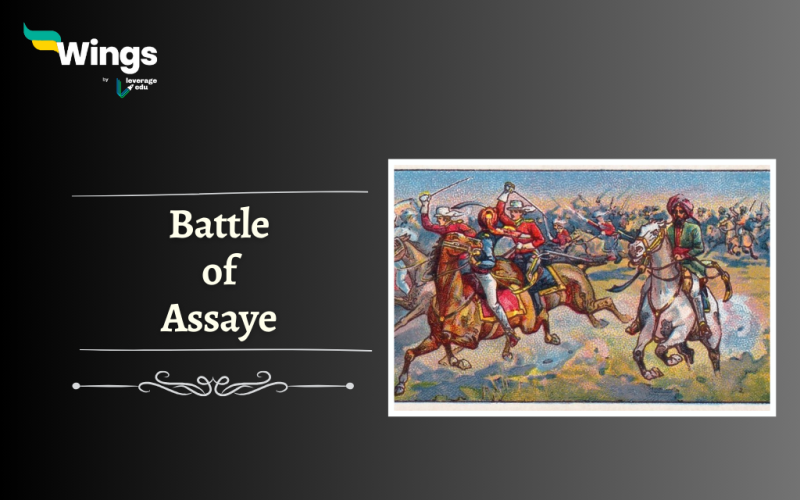The Battle of Assaye was fought on 23rd September 1803, at a small village named Assaye in present-day Maharashtra. It was fought between the Maratha army and the British force. The battle resulted in a decisive victory for the British army over the Marathas. This battle was one of the important battles fought during the Second Anglo-Maratha War. Major General Arthur Wellesley commanded the British forces. He was the younger sibling of Richard Wellesley, who was the Governor-General of Bengal at that time. The Maratha army was a combined army of the Raja of Berar and Daulat Scindia. The Marathas were superior in numbers that comprised infantry, cavalry and artillery. Moreover, they were accompanied by some European officers and also were under the command of Colonel Anthony Pohlmann, who was a former German officer in the British forces.
Table of Contents [show]
| Battle of Assaye Overview | |
| Battle Took Place On | 23rd September, 1803 |
| Place | Assaye, Maharashtra |
| Fought Between | Marathas Vs East India Company |
| Won By | East India Company |
Background of the Battle of Assaye
The Holkars of Indore were the rivals of Maratha Peshwa Baji Rao II and conspired to drive him out of the capital of Poona.
- Seeking refuge from the British, Baji Rao II was reinstated in Poona in exchange for some territory and the presence of British troops, as per the Treaty of Bassein.
- This resulted in British dominance over the Peshwa and indirectly over the other Maratha chiefs.
- Objecting to this, the other Maratha chiefs (Scindias and Bhonsales) refused to acknowledge the Treaty of Bassein, leading to the Second Anglo-Maratha War.
- However, the Holkars later joined the conflict against the indirect rule of the British, as they were unwilling to ally with their rival Scindias.

Event of the Battle
The British forces, even though were outnumbered, emerged as a victorious party in their battle against the Marathas.
- Arthur Wellesley, who was the young British commander, displayed exceptional intelligence and determination in overcoming the Maratha forces.
- The battle resulted in heavy casualties for both sides, with the British losing approximately 1600 individuals and the Marathas losing nearly 6000 men.
- Wellesley described this battle as “the bloodiest for the numbers that I ever saw.”
- The Maratha forces also exhibited remarkable courage and resilience during the fight, with their gunners demonstrating exceptional skill on the battlefield.
- However, the Marathas lacked a capable leader amongst themselves to guide and motivate them in battle.
- Additionally, the Marathas were also not unified. Only a quarter of their camp consisted of their regular soldiers, while the rest were called Pindaris, who did not receive a regular salary and were motivated by the prospect of sharing the spoils of victory.
- Furthermore, the regular soldiers were dissatisfied with their low and irregular pay, unlike the well-compensated Company forces.
- The Marathas, relying on their larger force, did not anticipate an attack from Wellesley and were caught off guard when it occurred.
Also Read – Battle Of Diu: Background, Event, Outcome & More
Outcome of the Battle
The battle of Assaye resulted in an important war in the Second Anglo-Maratha War. It ended with heavy casualties, but a win by the British forces.
- The aftermath of the war was now the British administration had control over the large parts of Central India.
- Also, this battle contributed towards kicking off the career of Sir Wellesley. He later went on to command in the Battle of Waterloo and won against Napolean.
- He also served as the Prime Minister of Britain for two terms.
FAQs
Napoleon in India was defeated by Major General Arthur Wellesley, the 1st Duke of Wellington.
All the Maratha forces were defeated by the Britishers in the Second Anglo-Maratha War. The Scindias signed the Treaty of Surji-Anjangaon in 1803, the Bhonsles signed the Treaty of Deogaon in 1803 and the Holkars signed the Treaty of Rajghat in 1805, giving their territorial control to the Britishers.
The war was a result of the power struggle that had developed between the Maratha confederacies. The British took advantage of the rivalry in the Battle of Assaye resulting in the eventual defeat of the Maratha confederation.
Relevant Blogs
This was all about the Battle of Assaye. For more content related to the different states of India, visit our articles like this, you can get Study notes on the Modern History of India here. Also, you can visit our general knowledge page on Indian History!
 One app for all your study abroad needs
One app for all your study abroad needs















 45,000+ students trusted us with their dreams. Take the first step today!
45,000+ students trusted us with their dreams. Take the first step today!
